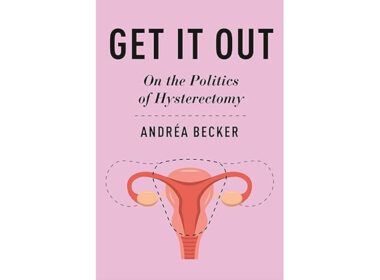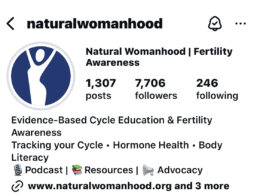This past week, the London-based publication The Guardian published a reporting piece discrediting the fertility awareness app FEMM. The Guardian used FEMM’s mentions of birth control side effects, and information about its funders’ religious affiliation, to suggest to readers that fertility awareness apps cannot be trusted. The problem is The Guardian piece follows conspiracy-theory-like thinking, rather than facts and logic, in an apparent attempt to scare women away from Fertility Awareness-Based Methods.
Before jumping into the Guardian piece, I want to begin with a larger context. We at Natural Womanhood believe that for women to have fair and accurate information about their reproductive choices, they must be informed of the facts of all birth control options including all natural methods of family planning—i.e. modern, researched Fertility Awareness-Based Methods (FABM), also sometimes called methods of Natural Family Planning (NFP). Currently, in the United States and many parts of the world, women go most of their lives only informed of hormonal contraceptives or condoms when it comes to family planning options. That is why we strive to provide information about natural, scientific methods of charting one’s cycle and understanding when she’s fertile, so women to have the freedom to make informed choices.
There are many outlets that cite inaccurate data on Fertility Awareness-Based Methods, or simply poorly researched accounts that appear biased toward hormonal birth control and against showing FABM in a fair and balanced light. For example, last year we published our fact-checked version of a Cosmopolitan article that appeared to intentionally misguide readers to view modern, research-supported Fertility Awareness-Based Methods (such as the Sympto-Thermal Method, Creighton Method, Billings Ovulation Method, or Marquette Methods, to name a few) on par with the less-tested and much-outdated Rhythm Method from the 1930s. Women who successfully use natural family planning to avoid or achieve pregnancy have long rolled their eyes at misinformation like this. But many other readers who trust these outlets are unaware they’ve been given false information.
We at Natural Womanhood believe that when media outlets misrepresent evidence-based methods of natural family planning, it obstructs true women’s health and reproductive choice. By providing inaccurate information to women, such outlets are suggesting women cannot weigh accurate information for themselves and make the best choice for them. When outlets claim to be independent, factual, and honest, this is even more egregious.
Here is where The Guardian comes in. Let’s go step-by-step through the Guardian’s investigative piece and consider its claims.
“A popular women’s health and fertility app sows doubt about birth control . . .”
The first sentence and much of the report suggests readers should view with skepticism any source that suggests a critical view of birth control. This is silly, since there are numerous sources reflecting doubt about birth control outside of FABM apps. Lawsuits such as the ones against Bayer for the Yaz pill (with more than 10,000 plaintiffs and $2 billion in damage payments) and against Merck for the Nuvaring (about $100 million) are symptoms of what we see as a deeper phenomenon. Data shows further that in some countries women are discontinuing hormonal birth control methods as they become aware of their side effects and risks.
Women’s stories of negative experiences and reports of birth control side effects abound—including those published in outlets like The Guardian itself, such as this 2019 piece citing connections with mental-health problems and cancer; this 2018 piece by a woman who suffered debilitating pain after taking the Essure implant; this 2016 piece on a woman who died of birth-control related blood clots; and this 2013 piece on 35 French women dying from taking a birth-control drug, to name a few.
After Netflix published the 2018 documentary The Bleeding Edge, sharing the horrors women experienced due to the birth-control device Essure, Bayer removed Essure from the market. Investigative pieces like this 2014 Vanity Fair article on the Nuvaring exist as well. For a long time, women have had doubts about birth control and it’s not because apps like FEMM are feeding it to them; many are seeking natural methods like these because they have developed their doubts from first-hand experience. And they deserve to know about side-effect-free options.
“Reproductive health is the right of every woman,” Anna Halpine, the CEO of FEMM, has said in a statement. “Every woman deserves to know as much about her reproductive health as possible. Education is central to informed choice, and expands the reproductive health choices available to women. FEMM is committed to providing this access and choice.”
In one part of the article, The Guardian explains, “Part of the FEMM app encourages women to visit its own network of physicians for hormone tests, which it claims can diagnose ‘underlying’ medical disorders.” But even birth-control-prescribing OBGYNs know hormonal contraceptives cover up underlying medical disorders like endometriosis and polycystic ovarian syndrome (PCOS). There is an extensive body of medical science based on fertility charting that assists doctors in identifying and treating infertility and other health issues. There are more and more OBGYNs who offer information about Fertility Awareness-Based Methods among their family-planning options. Here, The Guardian again reveals its lack of knowledge on the topic, as well as its apparent goal to paint fertility awareness healthcare as suspicious, even when medically sound.
As Dr. Bob Scanlon, FACOG, a practicing OBGYN in New York State, and advisor to the FEMM board, has stated, “Every woman should know how her body works, and know that ovulation is a sign of health. This information empowers her to manage her health, in order to better achieve her long-term health and fertility goals. FEMM’s science and evidence-based approach, which makes this information accessible to women through its app, is an important contribution to women’s health in this country and around the world.”
Citing outdated data from the CDC
The Guardian article not only clumsily discredits the FEMM app in particular, it sows doubt in the efficacy of Fertility Awareness-Based Methods at large. While many Fertility Awareness-Based Methods of family planning have been extensively backed by medical research and have proven effectiveness rates of avoiding pregnancy on par with the Pill, The Guardian states, “Fertility awareness birth control methods, such as that promoted by FEMM are considered the least effective, resulting in roughly 24 pregnancies for every 100 women using a method, according to the Centers for Disease Control and Prevention (CDC).” It cites an old chart with outdated data pointing to a stated 24% failure rate of natural methods. However, if you visit the current CDC page on birth control methods today, that 24% stat and the outdated chart does not appear.
Instead, the CDC website currently states: “Understanding your monthly fertility pattern can help you plan to get pregnant or avoid getting pregnant. Your fertility pattern is the number of days in the month when you are fertile (able to get pregnant), days when you are infertile… Failure rates vary across these methods. Range of typical use failure rates: 2-23%.” The CDC cites a 2018 analysis of FABM research that reveals that the Marquette method of natural family planning, for instance, could result in as low as a 2-6.8% failure rate. According to the CDC, that’s at least as effective as the Pill, patch, ring, or injectable birth control methods.
Not only does The Guardian article cite inaccurate data regarding the CDC’s findings, it conveniently leaves out reference to the Food and Drug Administration’s 2018 approval of the FABM app Natural Cycles for use as an effective method of family planning. The FDA states that this natural option “can be used as a method of contraception to prevent pregnancy. The app, called Natural Cycles, contains an algorithm that calculates the days of the month a woman is likely to be fertile based on daily body temperature readings and menstrual cycle information, a method of contraception called fertility awareness.” The FDA cites studies that found the FABM app has a 1.8% failure rate for perfect use, and 6.5% failure rate for typical use. That means this FABM app is 93.5-98.2% effective in preventing pregnancy, as evidenced by this FDA approved research (again, at least as effective as the Pill), which is something, unfortunately, readers who trust the Guardian would never know. Thankfully, many women do their own research.
The Guardian also attempts to discredit FEMM for its reliance on doctors who are based in other parts of the world such as Chile. Meanwhile Natural Cycles, which was developed in Sweden, was approved by the FDA in the United States. Here, The Guardian seems unaware that fertility awareness is a global medically supported phenomenon. As FEMM has since stated, “FEMM’s global network includes health educators, nurse practitioners, family doctors, and OBGYNs in the United States, as well as in other countries. These medical providers are licensed in the territory they serve, in order to care for the women within their practices.”
Prioritizing anti-religious bias over proven scientific research
The Guardian article also states, “Other fertility apps have been criticized for monetizing intimate data, sharing data with third parties and lack of privacy protections. FEMM has not been accused of such behavior, but appears to be the first ideologically aligned fertility app.” In this line, The Guardian article reveals its goal to guide readers to mistrust the app based on ideological reasons. They’re making very damaging allegations about its efficacy with no substantial proof because they don’t agree with the views and values of one of the funders. While apps like Natural Cycles just mentioned have successfully proven the science of women’s health and fertility can lead to effective family planning, the Guardian chooses not to focus on the scientific rigor behind these methods, but instead focuses on the religious affiliations of the funders supporting the FEMM app.
The Guardian states that because much of FEMM’s supporting funds have come from funders who identify as Catholic, and who also have anti-abortion views, the scientific credibility of the FEMM app is null. Never mind that the science supporting the FEMM app is similar to the science supporting other modern evidence-based Fertility Awareness-Based Methods.
Why do the funders’ personal beliefs matter if the science speaks for itself? The Guardian doesn’t clarify, except to paint a conspiratorial picture of a powerful establishment trying to . . . what exactly? It’s unclear, but it suggests women are being controlled by men somehow, perhaps being misled into getting pregnant. Since, in reality, FABM methods lead to fewer unplanned pregnancies than the Pill, that’s one clear reason anti-abortion funders might support an app like FEMM. Also, there is no method of contraception that puts women more in the driver’s seat than Fertility Awareness-Based Methods.
The Guardian’s own motives are questionable
While The Guardian article reveals a discriminatory stance against certain creeds of funders throughout its attempt at an investigation piece, there’s reason to question the publication’s own motives and sources of revenue. It’s already common knowledge that The Guardian endorses the Labour Party routinely and it carries a clear political bias.
The tone and approach of this piece, attacking one specific app based on ideological values seems politically motivated. We want to believe that The Guardian is an independent newspaper (they did talk about the danger of birth control in the past after all), but it seems that this piece is an exception and it feels like they’re playing the game of the big pharmaceutical companies.
While we don’t know how much funding The Guardian receives from particular advertisers, we know pharmaceutical companies’ annual advertising budgets are numbered in the billions. Compared to such companies, the $1.67 million FEMM received over several years is a drop in the water. Should we be concerned more about the source of FEMM’s funding or the influence of the billions big pharma uses to promote their drugs?
We hope this article has cleared up any confusion or fear-mongering produced by the Guardian’s rushed report. And we encourage anyone seeking more information on the science of Fertility Awareness-Based Methods to learn more here.











